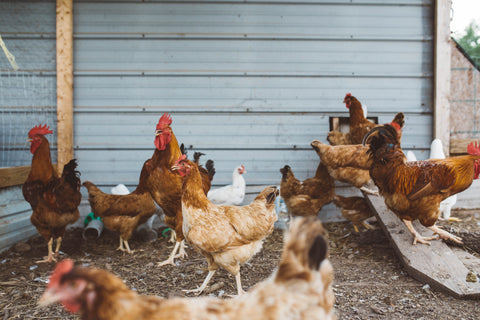Chickens caught a cold? Here’s what might be the cause.
It’s not just the cold weather that might see your hens showing signs of sniffles and runny noses. Fortunately, chickens don’t get “colds” like humans but are quite susceptible to viral respiratory diseases with two being the most prevalent.
Symptoms and causes
You might see the following symptoms in your hens:
- A clear discharge from their nostrils
- Coughing
- Sneezing
- A raspiness or rattling sound to their breathing
- Stretching out their necks
- Gasping for breath
- Reduction in egg laying
- Drop in eggs size, irregularly shaped eggs, or soft egg shells
The most common causes of these symptoms are:
- Avian infectious bronchitis (IBV)
- Infectious laryngotracheitis (ILT)
Avian infectious bronchitis
Avian infectious bronchitis doesn’t normally harm older hens but mortality can be relatively high for young hens under about 5 weeks of age. Most layer hens, such as our Hy-Line Browns, have been vaccinated for local forms of IBV but there are many different strains of the virus so it does not guarantee immunity from less common strains.
Hens will normally recover from the virus within 3 to 4 weeks but if one of your hens catches it, they will normally all get it. There are no treatments available for infected hens but they will benefit from good nutrition and added vitamins and minerals in their diet. Vitality Booster and Mother Hen‘s Remedy are two relevant nutritional boosters that will support fighting off and recovery from viruses. Keep an eye out for any secondary bacterial infections that are common in hens affected by IBV, as these infections may require an antibiotic to treat.
Infectious laryngotracheitis
Infectious laryngotracheitis shares many similarities with the IBV virus but tends to have a higher mortality rate. Our Hy-Line Browns are also vaccinated for the common strains of ILT but again, due to the range of different strains in circulation, problems can still be caused if hens become infected by any of them.
Hens that recover from ILT will be carriers for life so be aware of this when thinking of introducing new hens into your flock. Similarly to IBV, the virus is quite fragile and can be killed by disinfectants, heat, and direct sunlight when present in your hen‘s environment. However, ILT can survive for up to 2 months in bedding and nesting materials so a good clean-out of bedding and litter is essential.
When your chickens exhibit signs of respiratory issues like sniffles and runny noses, it's important to understand the causes and take appropriate measures to address the problem. While chickens don't catch colds like humans, they are susceptible to viral respiratory diseases, with avian infectious bronchitis (IBV) and infectious laryngotracheitis (ILT) being the most common culprits.
Recognising the symptoms, such as clear discharge from their nostrils, coughing, sneezing, and changes in egg-laying patterns, is crucial for early detection and intervention. Vaccination is available for some strains, but preventing the spread of these viruses requires good nutrition, proper hygiene, and a clean environment. Nutritional boosters like Vitality Booster and Mother Hen's Remedy can support their immune system, while regular cleaning and disinfection help eliminate the viruses from their surroundings. By staying vigilant and proactive, you can keep your flock healthy and minimise the impact of respiratory diseases on your chickens' wellbeing.






Comments (2)
Thank you for the information!
I have a baby hen she just started what seems like sneezing runny noise, what can I give her home remedies????